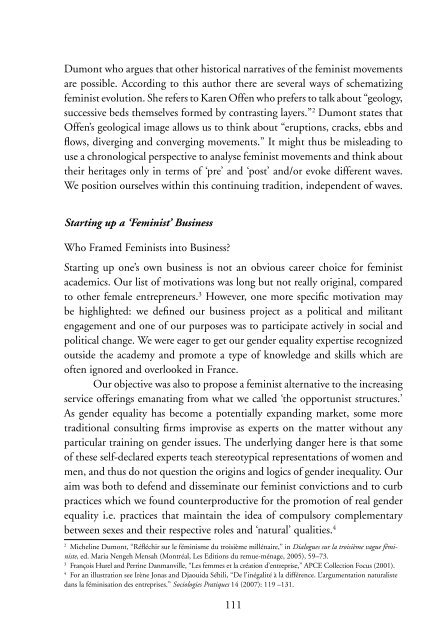Teaching with the third wave new feminists - MailChimp
Teaching with the third wave new feminists - MailChimp
Teaching with the third wave new feminists - MailChimp
You also want an ePaper? Increase the reach of your titles
YUMPU automatically turns print PDFs into web optimized ePapers that Google loves.
Dumont who argues that o<strong>the</strong>r historical narratives of <strong>the</strong> feminist movementsare possible. According to this author <strong>the</strong>re are several ways of schematizingfeminist evolution. She refers to Karen Offen who prefers to talk about “geology,successive beds <strong>the</strong>mselves formed by contrasting layers.” 2 Dumont states thatOffen’s geological image allows us to think about “eruptions, cracks, ebbs andflows, diverging and converging movements.” It might thus be misleading touse a chronological perspective to analyse feminist movements and think about<strong>the</strong>ir heritages only in terms of ‘pre’ and ‘post’ and/or evoke different <strong>wave</strong>s.We position ourselves <strong>with</strong>in this continuing tradition, independent of <strong>wave</strong>s.Starting up a ‘Feminist’ BusinessWho Framed Feminists into Business?Starting up one’s own business is not an obvious career choice for feministacademics. Our list of motivations was long but not really original, comparedto o<strong>the</strong>r female entrepreneurs. 3 However, one more specific motivation maybe highlighted: we defined our business project as a political and militantengagement and one of our purposes was to participate actively in social andpolitical change. We were eager to get our gender equality expertise recognizedoutside <strong>the</strong> academy and promote a type of knowledge and skills which areoften ignored and overlooked in France.Our objective was also to propose a feminist alternative to <strong>the</strong> increasingservice offerings emanating from what we called ‘<strong>the</strong> opportunist structures.’As gender equality has become a potentially expanding market, some moretraditional consulting firms improvise as experts on <strong>the</strong> matter <strong>with</strong>out anyparticular training on gender issues. The underlying danger here is that someof <strong>the</strong>se self-declared experts teach stereotypical representations of women andmen, and thus do not question <strong>the</strong> origins and logics of gender inequality. Ouraim was both to defend and disseminate our feminist convictions and to curbpractices which we found counterproductive for <strong>the</strong> promotion of real genderequality i.e. practices that maintain <strong>the</strong> idea of compulsory complementarybetween sexes and <strong>the</strong>ir respective roles and ‘natural’ qualities. 42Micheline Dumont, “Réfléchir sur le féminisme du troisième millénaire,” in Dialogues sur la troisième vague féministe,ed. Maria Nengeh Mensah (Montréal, Les Editions du remue-ménage, 2005), 59–73.3François Hurel and Perrine Danmanville, “Les femmes et la création d’entreprise,” APCE Collection Focus (2001).4For an illustration see Irène Jonas and Djaouida Séhili, “De l’inégalité à la différence. L’argumentation naturalistedans la féminisation des entreprises.” Sociologies Pratiques 14 (2007): 119 –131.111
















